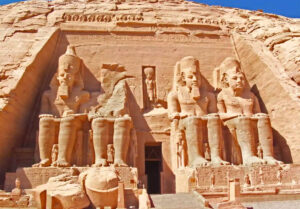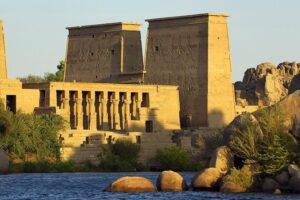The Ptolemaic Kingdom was an ancient Greek Hellenistic kingdom based in Egypt, founded in 305 BCE by Ptolemy I Soter, one of Alexander the Great’s generals. It ruled Egypt for nearly three centuries until the death of Cleopatra VII in 30 BCE and the subsequent Roman conquest. This dynasty profoundly shaped Egypt, blending Greek and Egyptian cultures, establishing Alexandria as a major intellectual and economic hub, and maintaining a powerful, centralized state.
Foundation and Early Rulers of the Ptolemaic Kingdom
Following Alexander the Great’s death in 323 BCE, his vast empire was divided among his generals, known as the Diadochi. Ptolemy I Soter, who had served as Alexander’s trusted bodyguard, secured Egypt as his satrapy. In 305 BCE, he declared himself king, formally establishing the Ptolemaic dynasty. Ptolemy I laid the groundwork for a highly centralized and prosperous kingdom. He moved the capital from the ancient city of Memphis to the newly founded Alexandria, a Greek city on the Mediterranean coast. Alexandria quickly became a beacon of Hellenistic culture, boasting the famous Library of Alexandria and the Pharos Lighthouse, one of the Seven Wonders of the Ancient World.
Early Ptolemaic rulers, such as Ptolemy II Philadelphus (283–246 BCE), continued to expand the kingdom’s influence, establishing control over parts of Syria, Asia Minor, and the Aegean. They also solidified the administrative and economic systems that would characterize Ptolemaic rule.
Administration and Economy
The Ptolemies implemented a highly centralized and bureaucratic administration, largely based on existing Egyptian structures but infused with Greek efficiency. At the top was the king, supported by a vast network of Greek-speaking officials. The country was divided into nomes, traditional administrative divisions, each overseen by Greek officials. While native Egyptians could hold minor administrative roles, the upper echelons of power were predominantly Greek.
The economy of Ptolemaic Egypt was primarily agrarian, heavily reliant on the fertile lands irrigated by the Nile. The Ptolemies introduced new crops, such as durum wheat, which fetched higher prices in international markets, and expanded the cultivation of wine and olive oil. They also established a closed currency system, meaning foreign merchants had to exchange their currency for Egyptian money, allowing the Ptolemies to profit from these transactions. This centralized control over agriculture and trade made Ptolemaic Egypt the wealthiest of the Hellenistic kingdoms. The state maintained monopolies on key industries like oil, papyrus, and textiles, further bolstering royal revenues.
Society and Culture
Ptolemaic society was a mix of Greeks, Egyptians, and other groups. The Ptolemies acted as Egyptian pharaohs in religious contexts. However, they remained a Greek-speaking elite. They strongly promoted Hellenistic culture. Alexandria became a major center for Greek scholarship, science, and art.
Despite Greek dominance, native Egyptian culture persisted. This was especially true in rural areas. The rulers of the Ptolemaic Kingdom knew they needed their Egyptian subjects’ loyalty. They supported Egyptian temples, funded new construction, and joined religious festivals.
This led to cultural syncretism. People often identified Greek and Egyptian deities with each other. Examples include Zeus with Amun and Osiris with Dionysus. New composite gods like Serapis also emerged. The demotic script was a cursive form of ancient Egyptian. It remained widely used for everyday documents and literature, alongside Greek.
Decline and the End of the Ptolemaic Kingdom
By the 2nd century BCE, the Ptolemaic Kingdom began to face internal strife, including dynastic disputes, revolts by the native Egyptian population, and increasing economic strain. Externally, the rising power of Rome increasingly influenced Ptolemaic affairs. The later Ptolemaic rulers often relied on Roman intervention to maintain their throne, gradually becoming client kings.
The dynasty culminated with Cleopatra VII Philopator (51–30 BCE), arguably the most famous Ptolemaic ruler. She was a highly intelligent and charismatic queen who famously formed political and romantic alliances with Roman leaders Julius Caesar and later Mark Antony to preserve Egypt’s independence. She was the only Ptolemaic ruler known to have learned the Egyptian language. However, her defeat alongside Mark Antony at the Battle of Actium by Octavian (Augustus) sealed the fate of the kingdom. Following her suicide in 30 BCE, Egypt was annexed as a Roman province, marking the end of the last great Hellenistic kingdom and a significant chapter in ancient Egyptian history.
Check the weather in Egypt before you go, and contact us for your Egypt Tours.











